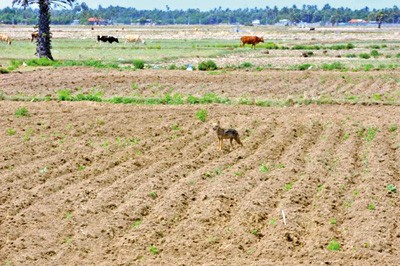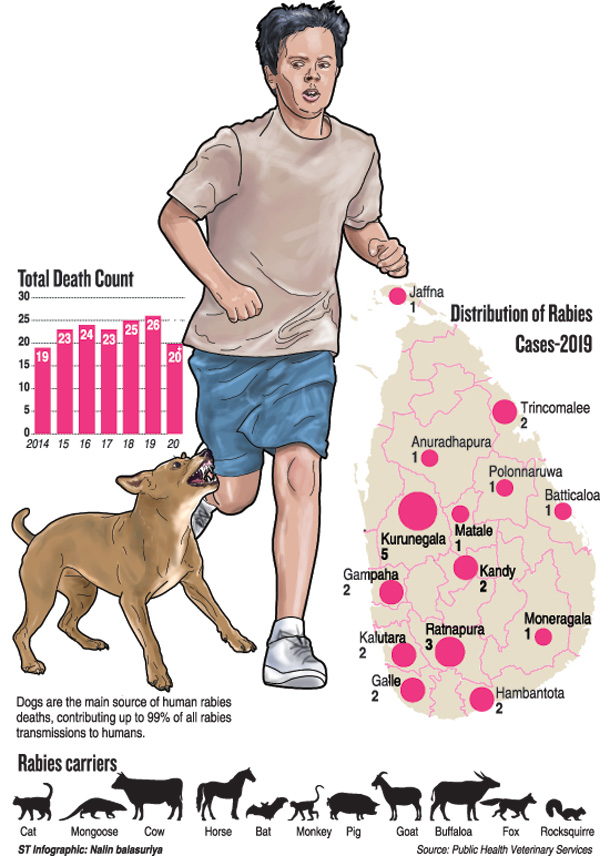News
Check your dogs, not the jackals, rabies officials warn
As two more people died from rabies this week, taking to 18 the fatalities so far this year, strong warnings have gone out to the public to vaccinate local dogs against the illness rather than pointing the finger at jackals and other wildlife.

A jackal in Jaffna: Director of Wildlife Health Dr. Tharaka Prasad said people should vaccinate their dogs before they point fingers at wildlife. Pic by Romesh Madushanka
A 12-year-old boy, Kahawe Guruge Gawesh, and an adult male, Sarath Sameera, 54, were the latest to die of rabies.
Three teams of health officers have been sent into Udugama and Maplagama in the Galle area, where the two deaths occurred, to carry out dog vaccinations.
Galle District’s Deputy Director of Health Services Kanchina Samararatna said vaccination programmes had been set back this year due to the coronavirus lockdown.
Dog bites are the primary cause of rabies, and omission to seek immediate treatment helped spread infection, the head of the Rabies Treatment Unit at the Colombo national Hospital, Dr. Amila Gunasekera, said. Dog bites cause 99 per cent of rabies cases, the World Health Organisation (WHO) says.
Dr. Gunasekera said some people were still unaware of the agonising nature of the disease and its cause and symptoms despite government education programmes.
“This year, the unit reported 5,700 suspected cases of rabies from January to September,” Dr. Gunasekera said, adding that to date this year, the illness had taken 18 lives.
He said although the illness rate was proportionally smaller than the 12,386 cases reported in 2019, “we have to consider the fact that fewer people turned up during lockdown”.
Once a person shows signs of rabies no cure is possible, so anyone bitten by a suspected rabid animal should head for hospital immediately for diagnosis and preventive treatment, Dr. Gunasekara said.
The incubation period can stretch from three months up to two years according to the area bitten.
“A person infected can live years without showing signs until later stages of the disease. This is because the virus travels to the brain via nerves. Once the symptoms worsen the patient dies,” the physician said.
The rabies virus is spread by the saliva of an infected animal when the animal bites, scratches or licks an open wound or an area such as the eyes.
The illness takes two forms in animals: the more dramatic form is furious rabies, where the affected animal shows aggressive behaviour and salivates. The other is referred to as dumb rabies which makes the animal less violent and express signs of paralysis. In humans, four out of five cases suffer furious rabies, the WHO says.
Dr. Gunasekera explained that patients experience strong spasms, weakness and complications in motor skills as their brains swell. Spasms in their throats lead to intense pain as they inhibit the patient from eating and drinking. Hydrophobia occurs as a result of this. 
“Following that, the suffering patient experiences agonising death due to respiratory or heart failure after weeks of suffering,” he said.
Vaccination was the only safeguard from rabies, Dr. Gunasekera said, and infected people should follow the entire course of injections to be safe.
“The Rabies Unit issues patient’s vaccinations. A single vaccine issued for a person is worth over Rs. 50,000 but the government issues them free of charge, so patients should follow through with their treatment,” Dr. Gunasekera said.
Rabies can also be contracted through cats, mongooses, civets, bandicoots, giant squirrels, bats, monkeys and jackals as well as cattle.
Reacting to claims that jackal bites caused some of the most recent rabies deaths, Director of Wildlife Health Dr. Tharaka Prasad said people should vaccinate their dogs before they point fingers at wildlife.
It has been reported that in Millaniya a dog contracted rabies and spread the disease to jackals.
“If dogs are vaccinated the jackals would not contract rabies from them, and they would not spread the disease to humans. People should vaccinate house pets and community dogs to safeguard themselves,” Dr. Prasad said.
“Rabies can be spread both ways: a dog could infect a jackal or a jackal could infect a dog. It is the dog owners’ responsibility to vaccinate dogs and safeguard them-selves.”
Dr. Prasad said teams from several government agencies were out vaccinating dogs in the Millaniya-Udugama area.
He said suggestions about culling jackals or vaccinating them were impractical and rejected the idea of broadcasting bait injected with anti-rabies vaccine for jackals to eat.
Additional reporting by our Ahangama correspondent, Sumathipala Diyagahage
| Just a scratch, they thought, but it killed the boy | |
| An event brushed off as a simple accident one-and-a-half months ago led to the death this week of 12-year-old schoolboy, Kahawe Guruge Gawesh. Gawesh, who lived in Gorakagasduwa, Maplagama, near Galle, was cycling to his tuition class when a dog jumped out at a girl who had been with him. She fell against Gawesh’s bicycle, throwing him off-balance, and in the commotion the boy was scratched by the dog. Gawesh’s sister, Waruni, said her brother had told her two days later that he had been scratched by a dog on his way to tuition class but she had not considered it a serious matter. “My brother complained of leg and back pain on Saturday, September 26, so we took him to Udugama Hospital. He was transferred to Karapitiya Hospital the following day,” Ms Guruge said. The boy died the following day. “I was with my brother in hospital,” Ms Guruge said. “He was shivering and was having difficulty breathing. Later, he was unable to drink water. “I explained the situation to the doctors and explained the incident, and they put him in a separate area and gave him treatment. “My brother’s condition became worse. He told me that the pain was like being killed. “Then he said he was dying. He asked me not to cry.” Gawesh’s mother, Chithra Nandani Guruge, 48, said the family had not thought the dog scratch to be a serious matter. Samples of tissue from the boy’s body have been sent for analysis so that the cause of death can be formally established. The Inquirer into Sudden Deaths R.M. Nazim, ordered the body to be released to the family with instructions that the coffin be sealed.
|

